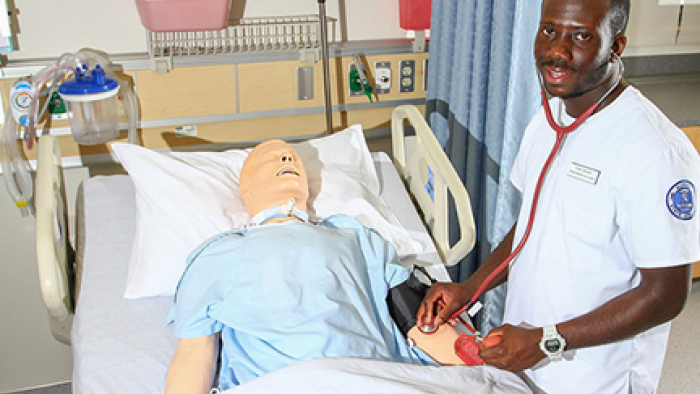
At a glance
 In December, Gov. Andrew Cuomo signed legislation that requires future registered nurse (RN) graduates of associate degree and diploma nursing programs to finish a baccalaureate completion program in nursing within 10 years after initial licensure in New York State.
In December, Gov. Andrew Cuomo signed legislation that requires future registered nurse (RN) graduates of associate degree and diploma nursing programs to finish a baccalaureate completion program in nursing within 10 years after initial licensure in New York State.

Future nurses in New York State are now required to earn a bachelor’s degree. Fortunately, Alfred State College (ASC) has a number of ways to assist students and existing nurses with earning their degree.
In December, Gov. Andrew Cuomo signed legislation that requires future registered nurse (RN) graduates of associate degree and diploma nursing programs to finish a baccalaureate completion program in nursing within 10 years after initial licensure in New York State. The basis for the law is evidence confirming better outcomes when patients receive care from baccalaureate-prepared nurses.
 Among the college’s 70-plus majors is a Bachelor of Science in nursing (BSN) degree, which is accredited by the Commission on Collegiate Nursing Education (CCNE), the Middle States Commission on Higher Education, and the New York State Education Department.
Among the college’s 70-plus majors is a Bachelor of Science in nursing (BSN) degree, which is accredited by the Commission on Collegiate Nursing Education (CCNE), the Middle States Commission on Higher Education, and the New York State Education Department.
Additionally, in order to meet the needs of registered nurses seeking a bachelor’s degree, the RN to BSN program is offered primarily in an online format. This provides flexibility and learning style choices for the adult student and working professional.
“There are a number of paths that students may take in order to earn their BSN degree at Alfred State,” said ASC Nursing Department Chair Linda Panter. “We offer a flexible format to accompany the schedules of the adult student and working professionals, as well as a fully accredited curriculum, modern technology, and clinical experiences that ensure these students are receiving a high-quality education.”
The law, which took effect. Dec. 18, 2017, would not affect those who are “grandparented,” including RNs who were licensed on or before that date, as well as any person who was enrolled in, accepted in, or waitlisted for later acceptance in a diploma or associate degree program in New York State before that date. This means they will not be required to earn a bachelor’s degree to maintain permanent RN licensure in New York State after they graduate.
Admission to Alfred State’s RN to BSN program requires graduation from an accredited or state-approved associate degree in nursing or certified diploma program in nursing, and plans to secure licensure as a registered professional nurse by the end of the first semester in the program. Graduates of Alfred State’s Associate in Applied Science (AAS) in nursing may enter directly into the college’s BSN program, which can be completed full-time in two years or part-time as the student desires.
“Alfred State is doing its part to ensure that future nursing students meet the requirements of this new law, and receive the skills, knowledge, and experience they’ll need to provide the best healthcare possible to their patients,” Panter said.
ASC also offers a dual degree nursing program, which allows students to earn both an associate and baccalaureate degree over four years. The graduates of the associate program are eligible to sit for the NCLEX-RN exam at the end of the third year.
